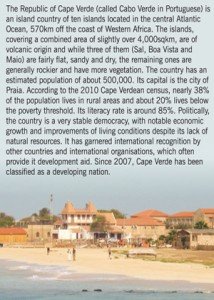What other aspects were taken into consideration?
Safety, Environmental Impact and rehabilitation aspects were also considered.
The negative environmental and social impacts of the rehabilitation of the 6km main road to Cidade Velha are very minor and no land acquisition would occur as the rehabilitation would only concern the existing roads and right-of-way is not affected, consequently no compensation is anticipated. Operational Policy (4.11) of the World Bank/IDA concerning Physical Cultural Resources is being triggered for this second AF; the Environmental Impact Assessment (EIA)/Environmental and Social Management Plan (ESMP) for the road to Cidade Velha has been updated to ensure that the civil works carefully avoid existing cultural assets, such as an old cobblestone road and historical church. Guidelines for “chance finds” procedure will be integrated into the contracts for construction and road maintenance consultants. These include development of a cultural property management plan if physical cultural resources are found, in accordance with the government of Cape Verde policies and guidelines.
Regarding the rehabilitation of the 14km rural roads, a preliminary review has been completed and does not indicate any need for involuntary resettlement or land acquisition. Should there be any need for additional resettlement, the ARAP will be updated as and when necessary, once the alignment of the proposed rehabilitation is finalised. The EIA for the original project, which includes rural roads, will also be updated as and when necessary. The environmental aspects are expected to be minimal, while the social impacts are expected to be positive. Any updated EIAs, as well as the ESMPs, will be disclosed in-country, at the PCO and in all municipalities where works are planned. The proposed second AF triggers Operational Policy (4.01) of the World Bank/IDA for Environmental Assessment due to Safeguards performance which was reviewed and found satisfactory. For the original project an Environmental and Social Impact Assessment (ESIA), an ESMP and an Abbreviated Resettlement Action Plan (ARAP) were prepared and approved by the Bank.
Why did World Bank decide to go for additional financing for the project?
Provision of the proposed AF is necessary to assist in consolidation of the ongoing sector reforms and implementation of the proposed works which are also expected to buttress the economic recovery process.
A follow-on project to the current RSSP was initially sought by the government of Cape Verde. The proposed activities are, however, an extension of the activities in the original project. An AF instrument was therefore considered better suited, than a stand-alone project, to scale up the development impacts of the ongoing Road Sector Support Project.
The initial total cost of the Road Sector Support Project (RSSP) was estimated at US$17.48 million of which USD$15 million was funded by the International Development Association (IDA)[1]. The first AF became effective on September 15, 2008, and the total IDA credit amount revised to US$20 million after the first additional financing. The reworded objective of the RSSP is to assist the borrower to increase the mobility of the population in targeted areas and improve the planning and financing of the road sector through institutional reforms, and investment support for primary and rural roads. Increased mobility of populations in target areas captures better access to social and economic opportunities while improved planning and financing of the sector reflects better sector management.
Are you satisfied with the work?
Progress on implementation and towards achievement of development objectives has been satisfactory over the last year and is noted in the archived ISRs. All civil works activities have been satisfactorily completed and project funds are almost fully disbursed. There has also been steady progress in advancing the institutional reforms in the road sector seen in a functioning road fund generating approximately ECV 300 million annually, major improvements in the capacity of the National Engineering Laboratory (LEC) to fulfill its mandate, update of the legal mandate of the General Inspectorate of Public and Private Works (IGOPP) and improved capacity in MITT units to support ministerial planning and decision making. Professional staffing at IE has been increased, allowing consolidation of road sector responsibility at IE. The performance based maintenance contracts piloted under the original project have been expanded by IE, with the FR providing the funding. The timely availability of funds for road maintenance through the FR, and the consolidation of sector responsibilities at IE, are creating a sustainable institutional structure for the planning and management of the road network.
Although there were initial delays in the implementation of the institutional strengthening and reform component, the government is committed to completing the reforms and further strengthening sector institutions. Stakeholders in the sector, including MITT, IE and the FR fully support the project and activities proposed under the AF. So far the RSSP has met all relevant World Bank disbursement, procurement and fiduciary obligations as well as complied with all relevant,legal conevnants and safeguards requirements.
